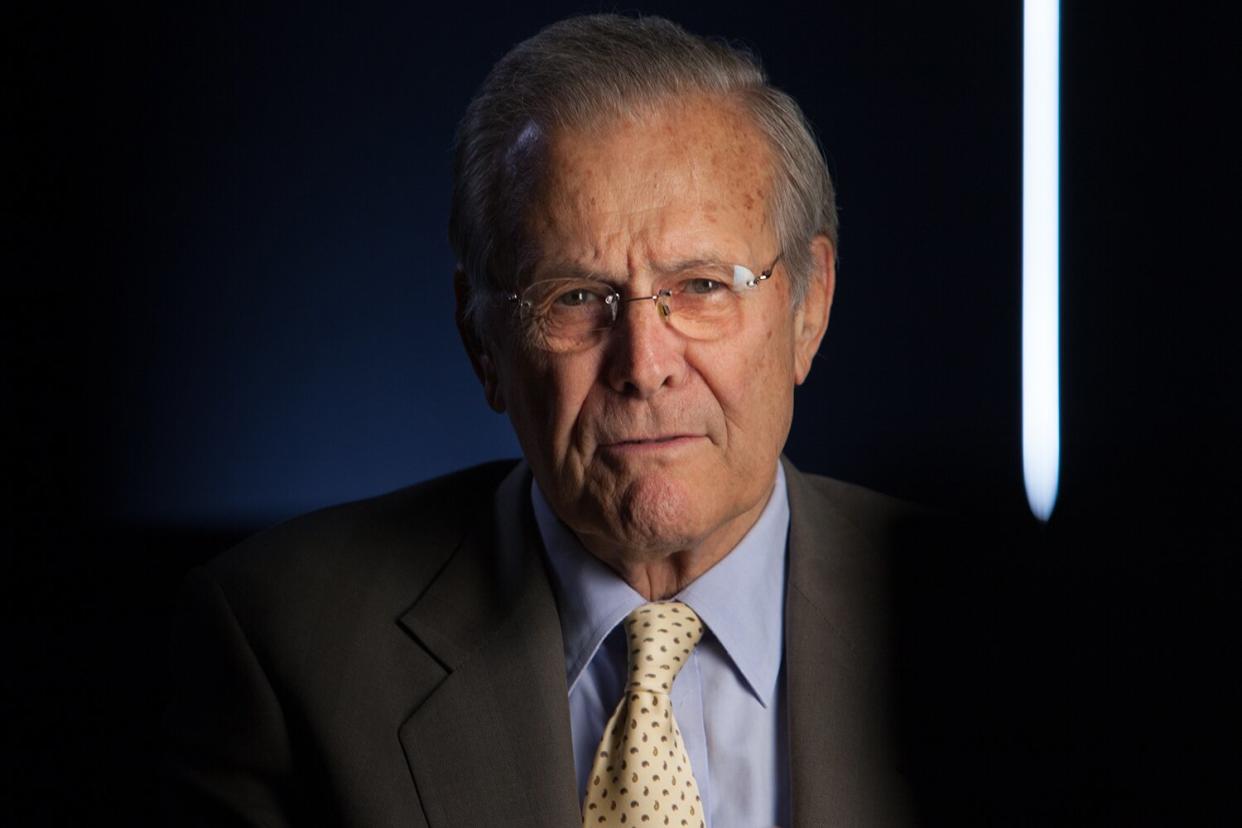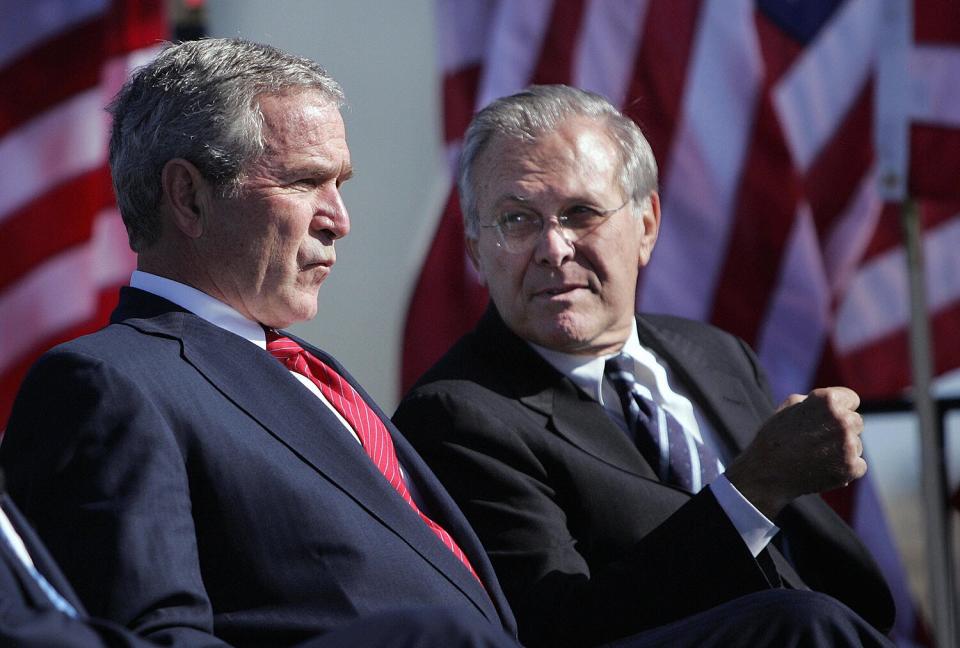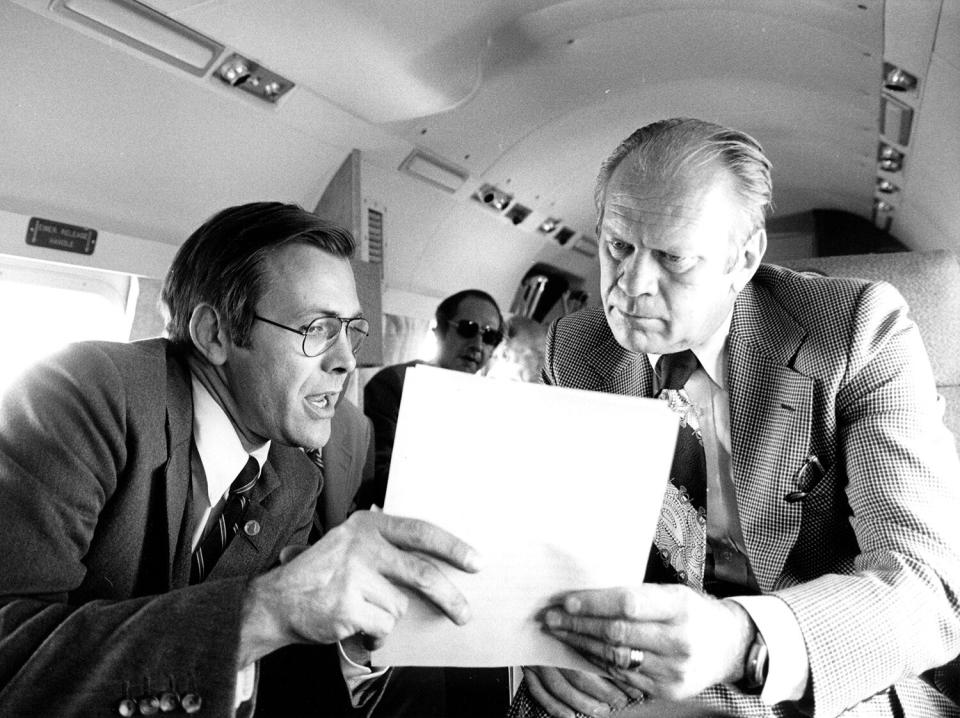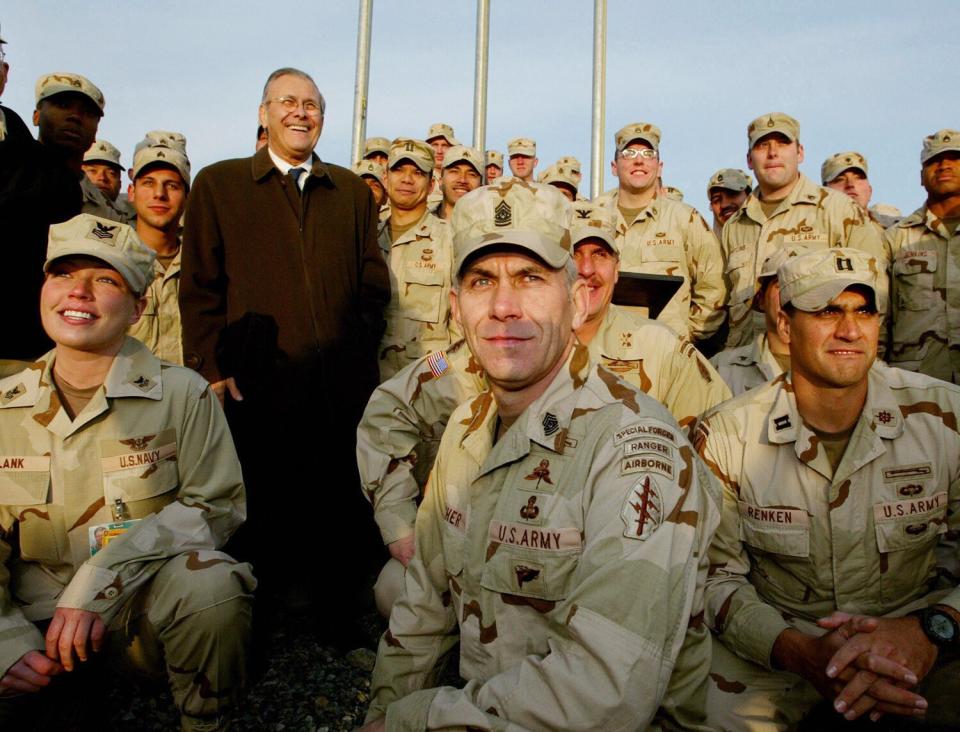Donald Rumsfeld, Who Oversaw George W. Bush's Middle East Wars, Dies of Cancer at 88

- Oops!Something went wrong.Please try again later.
- Oops!Something went wrong.Please try again later.
- Oops!Something went wrong.Please try again later.
David Hume Kennerly/Getty Donald Rumsfeld
Donald Rumsfeld, who served as the country's youngest and then oldest defense secretary and whose decades-long career was ultimately defined by his management of two deeply divisive Middle East wars under President George W. Bush, died Tuesday. He was 88.
Rumsfeld's family announced his death in a statement on Wednesday, saying that he was "was surrounded by family in his beloved Taos, New Mexico."
He died of multiple myeloma, a type of blood cancer, a spokesman told USA Today.
A Navy man after college, Rumsfeld went on to represent his home state of Illinois in Congress from 1963 to 1969 before joining the administration of President Richard Nixon in various roles.
After Nixon's resignation in the Watergate scandal, Rumsfeld became successor Gerald Ford's chief of staff and then secretary of defense — a position he resumed 24 years later under President Bush, where he worked with longtime friend Dick Cheney, Bush's vice president.
RELATED: Julia Roberts Buys Donald Rumsfeld's Land

David Hume Kennerly/Getty From left: Joyce and Donald Rumsfeld

TIM SLOAN/AFP via Getty President George W. Bush (left) and Donald Rumsfeld
Rumsfeld's second stint as defense secretary lasted from 2001 to 2006, during which time he became the face of the administration's post-9/11 military conflicts as they ballooned in cost and death toll, without end, while the public increasingly turned against the incursions that the White House said were needed to ensure international security. (Rumsfeld continued to argue the same, years later.)
Described alternately as garrulous and even technocratic, with a focus on how to modernize inside the sprawl of the military, Rumsfeld had a penchant for "snowflakes" — numerous memos on all manner of topics, big and small. ("I don't want them to use initials that I don't understand. ... I have to ask questions about every third piece of paper I receive," he wrote in 2001.)
After leaving the Bush White House, Rusmfeld released a memoir in 2011 and sat for extensive interviews for a 2014 documentary. In 2016, he helped develop a phone-based card game app.
He also started an eponymous foundation with his wife, Joyce, focused on "encouraging leadership, public service and free political and economic systems."
Much of Rumsfeld's public profile in his final years was shaped by his time at the Pentagon under Bush:
What did he make of the decisions to go to war? Of the American military's strategy and struggles in Afghanistan and Iraq? Of the administration's faulty search for weapons of mass destruction? Of the notorious reports of detainee torture and of abuses at the military prison Abu Ghraib?
Was there more he would like to say?
The Rumsfeld family's statement said Wednesday that "history may remember him for his extraordinary accomplishments over six decades of public service, but for those who knew him best and whose lives were forever changed as a result, we will remember his unwavering love for his wife Joyce, his family and friends and the integrity he brought to a life dedicated to country."
Rumsfeld, for his part, had not wavered in his work.

Getty Donald Rumsfeld in 1969
Never miss a story — sign up for PEOPLE's free weekly newsletter to get the biggest news of the week delivered to your inbox every Friday.

David Hume Kennerly/Getty Donald Rumsfeld (left) and President Gerald Ford

LARRY DOWNING/AFP via Getty Donald Rumsfeld (in black) with the military
He wrote in his memoir: "Knowing what we later learned and recognizing the costs, there is not a persuasive argument to be made that the United States would be in a stronger strategic position or that Iraq and the Middle East would be better off if Saddam [Hussein, the Iraqi dictator] were still in power. In short, ridding the region of Saddam's brutal regime has created a more stable and secure world."
In his own statement on Wednesday, President Bush, 74, described Rumsfeld as purpose-driven and big-hearted, recounting how he went to the Pentagon on Sept. 11, 2001, in the immediate aftermath of the attack to help the survivors.
"For the next five years, he was in steady service as a wartime secretary of defense — a duty he carried out with strength, skill, and honor," Bush said.
Of Rumsfeld, Bush said, "He never paled before tough decisions, and never flinched from responsibility."
The documentarian Errol Morris, who spoke with Rumsfeld for some 33 hours for 2014's The Unknown Known, took an opposing view and found him not even indecipherable.
"I've made a whole number of movies over the years about characters that seem to be completely unaware of themselves. I suppose in English the word that we often use is 'clueless,' " Morris told reporters at the time. "That's the central feeling I'm left with at the end of making this movie."

